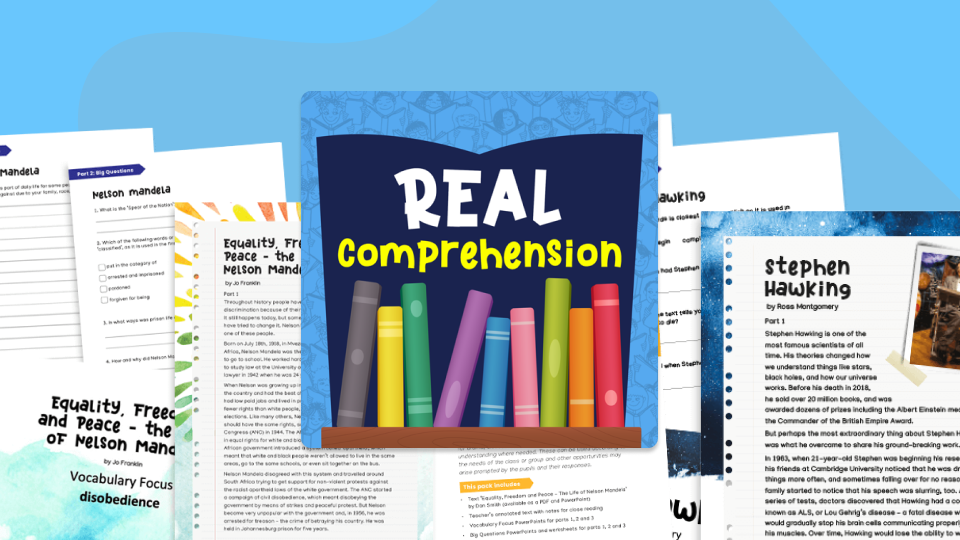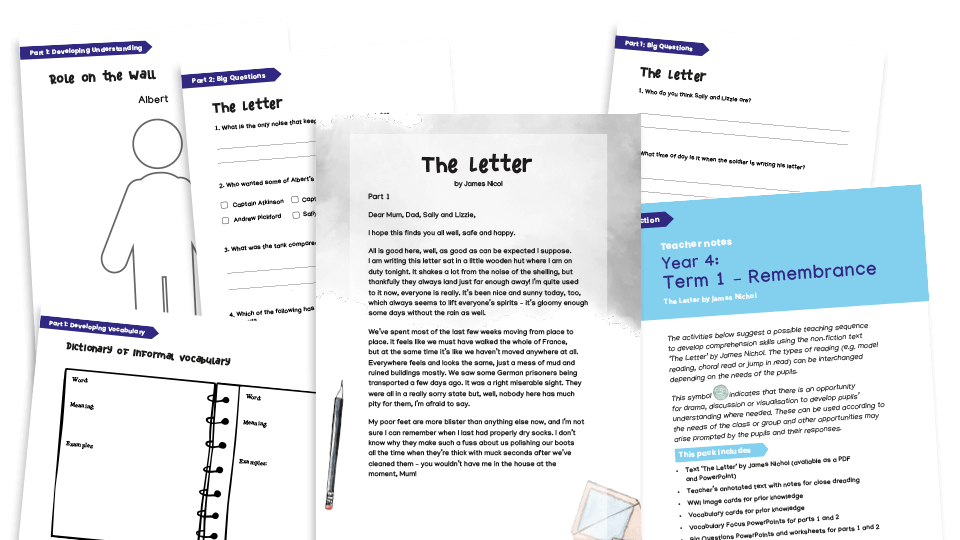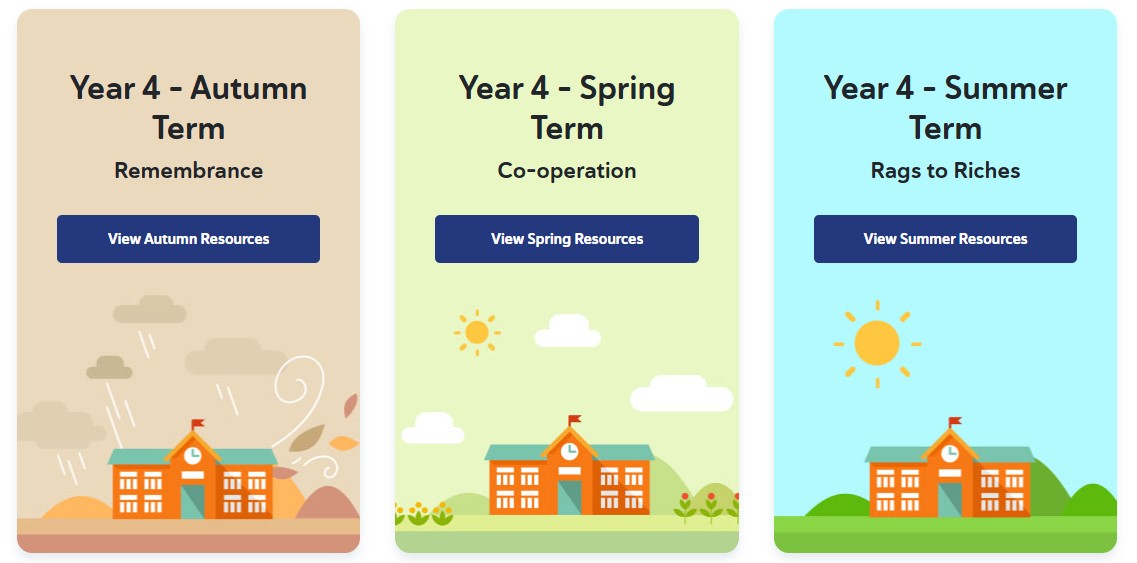Reading comprehension strategies for deeper pupil engagement

Helen Mulley, co-creator of Plazoom’s reading comprehension programme Real Comprehension, explores how to help pupils move beyond basic decoding to build deeper understanding and genuine reading for pleasure in KS1 and KS2…
Every teacher knows the feeling: you’ve taught a text over half a term and the class have been rapt as you’ve read it to them (with all the voices).
You’ve been asking questions to check understanding every step of the way, and you’ve talked about the right answers.
Then you bring out the end-of-unit assessment, and suddenly, it’s as if they’ve never even heard of the book. What happened?
Word reading vs comprehension
As the National Curriculum for England programme of study for English clearly sets out, learning to read has two very clear dimensions – word reading and comprehension. Each requires a different kind of teaching.
Whatever one’s personal feelings about synthetic systematic phonics (and let’s not forget, the reading wars are still very much ongoing), there’s no doubt that it is an extremely clear and structured approach through which to teach word reading, or decoding – a skill which is itself very straightforward to assess.
Teaching ‘reading comprehension’, on the other hand, is considerably less simple, both to plan and to track. How can we judge how well a child has understood something they have decoded; and indeed, what do we even mean by that?
Of course, we can check vocabulary; asking for definitions, synonyms and antonyms. There are also tried-and-tested ways of developing and measuring progress across other key comprehension skills, like retrieval, inference, sequencing, predicting and summarising. But is that enough?
'Getting' something
Poet and former Children’s Laureate Michael Rosen certainly doesn’t think so. Back in 2016, he published a blog on his website, titled Thoughts on ‘comprehension’ in the primary school, in which he commented, “We probably read in the hope of comprehending, or with comprehension. But we really read because we want to 'get' something from a passage, scene, book, poem etc., don't we?”
This idea, of ‘getting something’ from what we read, is really what we are talking about when we discuss the importance of promoting ‘reading for pleasure’.
We want children to pick up a book (or newspaper, magazine or comic), knowing that they are going to experience something more powerful and profound than simply the conversion of marks on a page into words and sentences. Emotions. Reactions. A real human connection.
What’s more, despite what many people seem to believe, the ability to make that kind of connection is not necessarily something that happens organically (although it can, to a certain extent). Like any other skill of comprehension, we can – and should – teach it.
Strategies for deep reading comprehension
1. Get the text right
When we started devising Real Comprehension, Plazoom’s unique whole-school comprehension programme for Years 1-6, we knew that we wanted to aim for a scheme and approach firmly rooted in this idea of building a profound connection between reader and text; and that securing the right texts would be critical.
“There are two main approaches to reading comprehension – extended novel study and repeated reading of extracts,” explains literacy consultant Rachel Clarke, who co-created the Real Comprehension programme alongside Linsday Pickton and Christine Chen (Primary Education Advisors) and Ruth Baker-Leask, director of Minerva Learning.
“Both have their benefits, but also their shortcomings. Extended texts may take several days or even weeks to complete, with some children losing interest over time. Meanwhile, when reading extracts, children rarely experience what comes before or after the section they are looking at, which many of them find confusing and dissatisfying.”
What we need for truly successful, deep comprehension practice are complete, short texts that are not only age-appropriate in terms of topic, tone and vocabulary, but also just the right length to read in one sitting and revisit over several lessons for deeper understanding.
For Real Comprehension, as for our other programme Real Writing, we therefore commissioned the texts we needed from published children’s authors. This meant that we could control the word count, theme and genre, whilst ensuring that every text would be a joy to read for its own sake.

2. Encourage comparison
One of the key reading comprehension strategies that we can easily overlook when planning a primary comprehension curriculum is that of making comparisons between texts, including children’s wider reading.
Often, the first time we explicitly ask young people to do this in any depth is when they start their English GCSE literature and language courses.
But in fact, there’s no reason at all not to develop this skill right alongside retrieval from the very start of a child’s reading journey.
Working with complete short texts, thematically grouped, is a great way to get young readers drawing out comparisons from a very early age.
In Real Comprehension, each unit of work includes three texts – fiction, non-fiction and poetry – on a shared theme, plus a wider reading list that you can explore, with question prompts to inspire discussion and debate.

The comparisons don’t need to be hugely complicated, especially at first. A simple query such as, “Which of these stories did you enjoy more?” can open up unexpectedly rich conversations, especially when followed up with more close questioning: “Why? What was it about the story that you especially liked?” Later on, you can start to draw out ideas of the author’s intent and how they executed this.
3. Build familiarity
If a child is struggling with a very basic level of comprehension – failing to grasp the order in which things are happening, for example, or what various pronouns are referring to – then making a deep connection that inspires a personal response is always going to be a challenge.
The more familiar and comfortable a child is with a text, the more able they will be to dig deeper than the surface meaning of its words.
If you are teaching reading comprehension in KS1 and KS2, a layered reading approach can make all the difference.
Layered reading
Layered reading involves multiple shared readings of a whole text using a variety of methods (e.g. chorus reading, paired reading, modelled reading, echo reading and so on).
As you go through each read, short, focused questioning zooms in on potential stumbling blocks for comprehension. For example:
- What is ‘it’ referring to here?
- What time of day is it? How do we know?
- What does [insert tricky vocab word] mean?
By the third or fourth read, everyone in the room is feeling comfortable enough to tackle more complex questions.
“The layered- and close-reading sequence we use for Real Comprehension, with a prior knowledge/vocabulary check before and a variety of recorded responses after, is working to lift the understanding of text in all manner of diverse schools,” says Lindsay Pickton. “The process is popular with teachers and their children, too.”
You can see this approach in action, in a live classroom setting, in our Unlocking Inference video CPD course, presented by Lindsay with Christine Chen.
It’s an incredibly powerful way of enabling sophisticated comprehension discussions that include every member of a classroom, regardless of their decoding skills or ‘reading age’.
We shouldn't underestimate the value of the confidence boost that comes from a ‘weak reader’ being able to express an opinion about the same text that is in front of everyone.
4. Get personal
All too often, especially when the pressure is on to support children through their Y6 SATs, teachers feel obliged to focus on drawing out comprehension answers from pupils that are essentially universal and can easily be checked against a detailed marking scheme.
However, as discussed earlier, truly meaningful comprehension is very much about readers’ personal responses. In this context, it can be argued that there are no ‘right’ or ‘wrong’ answers, as long as they can be clearly linked to and/or evidenced by the text.

Children with greater prior knowledge related to a text, or with more cultural capital generally, will be at an advantage when it comes to forming and expressing personal opinions about what they are reading.
It’s worth considering this carefully when planning for comprehension work. Make sure you allow time beforehand to explore what children already know and fill in any gaps where necessary.
“For Real Comprehension, we wanted children’s opinions and feelings in addition to them being able to find evidence or make predictions,” explains Rachel Clarke. “This meant we encouraged them to activate their background knowledge about a topic or theme first. Then, through questioning, vocabulary study, discussion, drama and role-play, we found ways for them to engage deeply with the texts so that they could develop secure understanding.
“From this, they would then be better able to give reasoned opinions and talk about how the texts had affected them.”
Recognising progress in reading comprehension
Judged through the lens of standardised assessments, progress in reading comprehension is largely about improved scores in SATs-style comprehension exercises.
However, this is only part of the picture. True comprehension is a less binary process, meaning that improvement is better observed through behaviours rather than marks.
After implementing the kinds of strategies woven into Real Comprehension, you might notice pupils beginning to move beyond literal answers, for example. A child who previously would have given single-word responses may now begin justifying their opinions, using the text for reference.
Spontaneous mentions of reading from outside the classroom will become more common, as will making connections between different texts and even between a story, poem or piece of non-fiction and children’s own experiences.
Discussion will become richer, questions more thoughtful and personal responses more naturally and confidently expressed. These are all powerful signs of deepening understanding.
Finding time for comprehension
With all this talk of repeated readings, multiple genres and sophisticated personal responses, you’d be forgiven for wondering how on earth any primary teacher is supposed to be able to fit deep comprehension practice into a timetable already full to bursting with curriculum requirements.
The key is to start early, and normalise the approach. Make conversations about how pupils feel about what they are reading part of everyday classroom life.
Get children used to talking about their own experiences before they dive into a new text, and encourage them to link fresh content to books, poems and stories they may have encountered outside school, or in previous years.
In this way, you can start to pull together children’s reading experiences as a kind of personal, internal library resource for each of them.
This helps them to understand how the external world informs and enhances their understanding of the written word, and, above all, works to avoid a situation where a ‘comprehension exercise’ is about as far removed from any notion of ‘reading for pleasure’ as you could imagine.